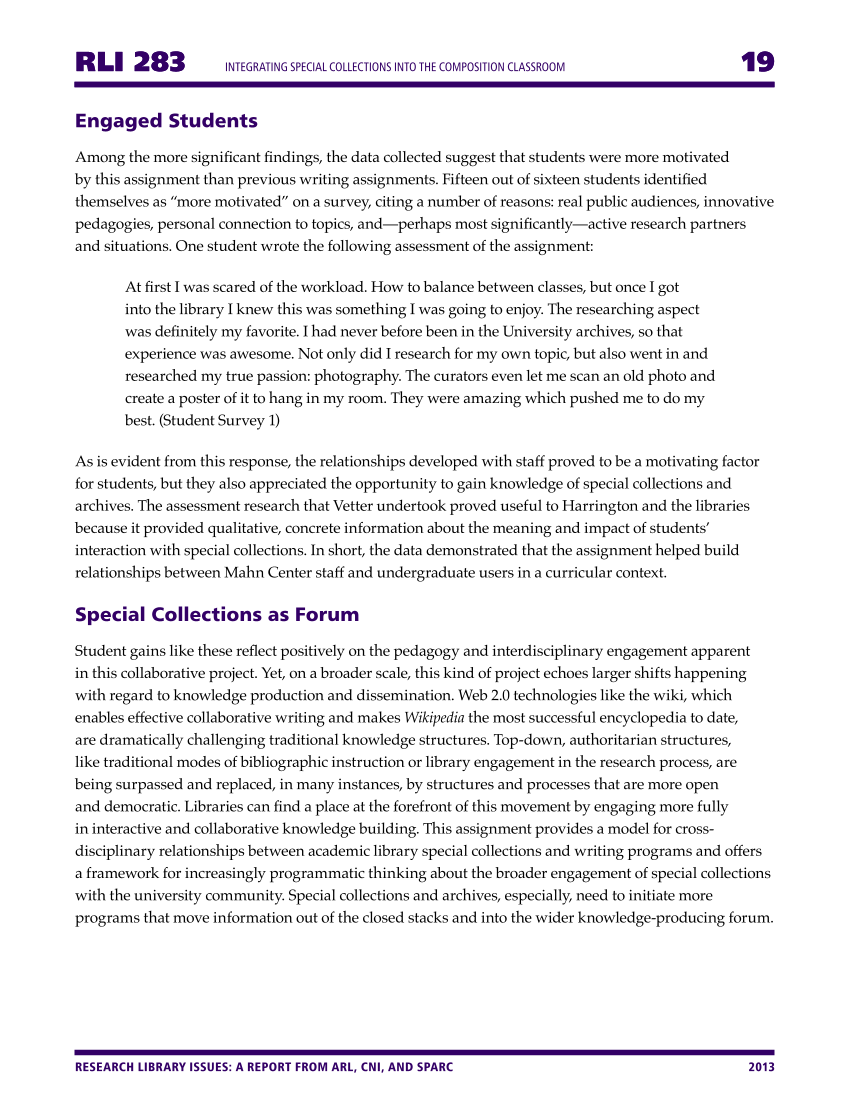RLI 283 Integrating Special Collections into the Composition ClassSroom 19 RESEARCH LIBRARY ISSUES: A REPORT FROM ARL, CNI, AND SPARC 2013 Engaged Students Among the more significant findings, the data collected suggest that students were more motivated by this assignment than previous writing assignments. Fifteen out of sixteen students identified themselves as “more motivated” on a survey, citing a number of reasons: real public audiences, innovative pedagogies, personal connection to topics, and—perhaps most significantly—active research partners and situations. One student wrote the following assessment of the assignment: At first I was scared of the workload. How to balance between classes, but once I got into the library I knew this was something I was going to enjoy. The researching aspect was definitely my favorite. I had never before been in the University archives, so that experience was awesome. Not only did I research for my own topic, but also went in and researched my true passion: photography. The curators even let me scan an old photo and create a poster of it to hang in my room. They were amazing which pushed me to do my best. (Student Survey 1) As is evident from this response, the relationships developed with staff proved to be a motivating factor for students, but they also appreciated the opportunity to gain knowledge of special collections and archives. The assessment research that Vetter undertook proved useful to Harrington and the libraries because it provided qualitative, concrete information about the meaning and impact of students’ interaction with special collections. In short, the data demonstrated that the assignment helped build relationships between Mahn Center staff and undergraduate users in a curricular context. Special Collections as Forum Student gains like these reflect positively on the pedagogy and interdisciplinary engagement apparent in this collaborative project. Yet, on a broader scale, this kind of project echoes larger shifts happening with regard to knowledge production and dissemination. Web 2.0 technologies like the wiki, which enables effective collaborative writing and makes Wikipedia the most successful encyclopedia to date, are dramatically challenging traditional knowledge structures. Top-down, authoritarian structures, like traditional modes of bibliographic instruction or library engagement in the research process, are being surpassed and replaced, in many instances, by structures and processes that are more open and democratic. Libraries can find a place at the forefront of this movement by engaging more fully in interactive and collaborative knowledge building. This assignment provides a model for cross- disciplinary relationships between academic library special collections and writing programs and offers a framework for increasingly programmatic thinking about the broader engagement of special collections with the university community. Special collections and archives, especially, need to initiate more programs that move information out of the closed stacks and into the wider knowledge-producing forum.




































